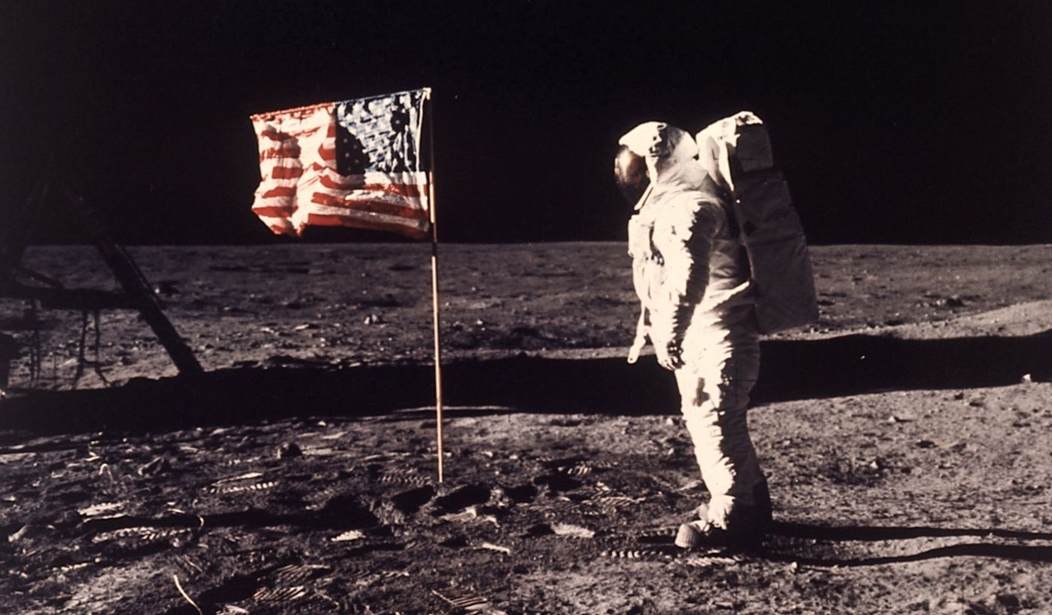Americans should cast their eyes skyward, with renewed focus, energy, and true enthusiasm. Here is why. For reasons simple and complex, patriotic and global, a second era of human space exploration is beginning.
Many saw last month’s SpaceX launch of two Americans on an American spacecraft from American soil. That launch was an inflection point, but not for reasons all recognize. While America’s operational tempo in space launch, travel to and from the International Space Station, and reusability will accelerate, that is only part of the story.
Restoring America’s manned space launch capacity is exciting, of course. American public-private partnerships making this happen doubles the excitement. Knowing others are in the hunt for competitive human launch options triples the excitement. These developments are helping reawaken public imagination, restart American reengagement with human space flight, and reassert American leadership in space transportation. But there is more at stake – and more at hand.
The United States, lest we forget, grew into being the preeminent space faring nation in the 1960s, first with one-man Mercury missions, suborbital pioneered by Alan Shepherd, orbital by John Glenn. Then we launched two-man Gemini missions, concluding with Gemini 12. That final Gemini mission was crewed by two men of destiny – Buzz Aldrin, who would later pilot the lunar module for Apollo 11, Mankind’s first visit to the moon, and Jim Lovell, who would miraculously bring home a wounded starship, Apollo 13, after a malfunction halfway to the moon.
Recommended
Mercury and Gemini presaged America’s Apollo program. Apollo missions 7 through 17 lifted three Americans out of Earth’s “gravity well” and together made America the unrivaled leader in human space exploration.
Having won the “space race” with the Soviet Union and proved democratic capitalism’s superiority over command-and-control communism, a lull settled over America’s human space exploration program in the eyes of the public. We and others refocused closer to home, sending astronauts to the International Space Station via Shuttle, and later – when America’s Shuttles were retired – by Russian spacecraft. Human space exploration took a backseat to near-earth missions and robotic science.
Having pioneered human space exploration and gotten to the moon’s surface six times in just over three years, with Apollo missions 11, 12, 14, 15, 16, and 17, America suddenly chose not to reach for the moon again. That was the state of play, the state of American ambition – or lack of ambition – until now.
And this brings me back to why the recent launch is more important than seems. The launch of Americans into space using American-grown technology not only affirms that we have that capacity, but reminds all of us of who we are, a space faring – and unrivaled space exploring – nation.
The operational tempo is about to resume. The United States is scheduled, once again, to reach outward – to commence crewed moon landings. And that is where real excitement begins.
Americans of this generation are about to experience the adrenaline rush, risk and reward, power of daring and sharing fears and jubilation, confidence boost that comes with saying let’s try, can-do, will do, and yes-we-did, that other generations have felt.
From our founding and technical victories in aviation, medicine, communication, and terrestrial transportation to being the first – and only – humans to walk on the moon, America has long been a leader. Now, a new generation is about to feel the thrill of perfecting technology, working together, vectoring to a single target, and putting a man on the moon again – and the first of many women.
But what is more exciting – if anything could be more exciting – is that America is about to restart the engine of national engagement in human space exploration. No time since the early 1960’s has been filled with so much potential, seen such a clear alignment of purpose, capability and can-do, as Americans are showing now.
And that is why the recent launch of Americans on an American spacecraft from American soil is so exciting. The point is not that we are doing something others cannot, nor that we are merely back in the game – launching for the International Space Station.
The point is that we are again on a quest – we are again aiming for the stars, beginning with a return of humankind to the moon, and once that goal is achieved with new acumen, restored attitude and rewarded ambition, we will turn our focus further yet – and begin the process of sending humans to Mars.
As someone who believes in this country with all his heart, who is convinced that when we work together, there is no limit to what we can achieve. Having lived through the early moon missions, I am ready for the next human space exploration era to begin – and am here to tell you, it has. So, climb aboard, buckle up, and prepare to work together toward America’s next grand adventure.
Grant Anderson, P.E. is the President & CEO of Paragon Space Development Corporation, a recognized leader in life support and thermal control in extreme environments. He holds a B.S. in Mechanical Engineering and an M.S. in Aeronautical & Astronautical Engineering from Stanford University.

























Join the conversation as a VIP Member